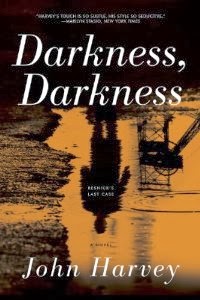Darkness, Darkness by John Harvey (Heinemann, £18.99)
 It’s not often I can say that I changed the course of literary history, but after I read a proof copy of John Harvey’s book I emailed him to say he had got a small but important detail of the aftermath of the 1984/85 Miners’ Strike in Nottinghamshire wrong and that he was not as conversant with the history of the local Robin Hood Railway Line as he could have been. John received the comments on the last day it was possible to make changes, and, rather than responding “nobody likes a smart-arse, especially one who knows about trains”, he was able to get the publisher to make the changes. There we have it then, another novel saved from sin… or at least two small sentences amended that perhaps nobody else would have noticed, but still.
It’s not often I can say that I changed the course of literary history, but after I read a proof copy of John Harvey’s book I emailed him to say he had got a small but important detail of the aftermath of the 1984/85 Miners’ Strike in Nottinghamshire wrong and that he was not as conversant with the history of the local Robin Hood Railway Line as he could have been. John received the comments on the last day it was possible to make changes, and, rather than responding “nobody likes a smart-arse, especially one who knows about trains”, he was able to get the publisher to make the changes. There we have it then, another novel saved from sin… or at least two small sentences amended that perhaps nobody else would have noticed, but still.
The paragraph above makes it clear that this novel is set in Notts, thirty years ago. It is, and in Notts nowadays too, thirty years after the strike, with Harvey’s Resnick called in to help a cold case when a body turns up, almost certainly someone who disappeared during the strike… a woman who campaigned against the pit closures, her husband being one of the Nottinghamshire majority who did not strike. Resnick had been there at the time of course, running agents in the coalfields who reported to him, and he reported up the line in turn. Resnick was not proud of what he had done, justifying it as helping to stop the prospect of civil war in the coalfields, coalfields in which he had friends on both sides of the picket line. And maybe he had nothing to be ashamed of, and maybe he did.
The first Resnick book appeared in 1989, Lonely Hearts, and this is the twelfth – and last – novel. Five Leaves has a walk on part in the Resnick saga as we published a novella and a limited edition of Resnick short stories, so I am not unbiased here. I like the series. I’m sorry that this will be the last, but that is John’s choice and he wanted to leave with as good a book as possible. And, mostly, it is. My reserve is twofold – the cold case device used to get Resnick back as a working policeman and his new working partner, the Kenyan Catherine Njoroge. The former I’ll accept, as how else could Resnick return at his age? The latter, in my opinion, does not work as well as some of his previous characters. But these are small points, and Harvey does leave Resnick as he should, working on a major Nottinghamshire story – perhaps the strike was the Nottinghamshire story of the last generation – and with the audience left wanting more. It is also a good fictional coda to the other material that has been coming out on Nottinghamshire in the strike year. And I think he gets the atmosphere of the time and place right.
Charlie Resnick will survive in people’s memory as a wonderful character, naturally flawed. A bit rumpled, a jazz fan, an outsider, a cat lover, someone never quite at ease with his role as a policeman but a copper who tried to use his role for good and as someone able to see the good in others. He will go out in a blaze of publicity – the author has thirty events in his diary already. I’d encourage you to attend at least one, locally at Waterstones, at Lowdham Book Festival, at Worksop and Newark Libraries and at the Bookshop. Though the Bookshop event will focus on John Harvey’s poetry for here too there will be a final volume, published, as this book is, on May 22. See the shop’s events list for details.
Ross Bradshaw
